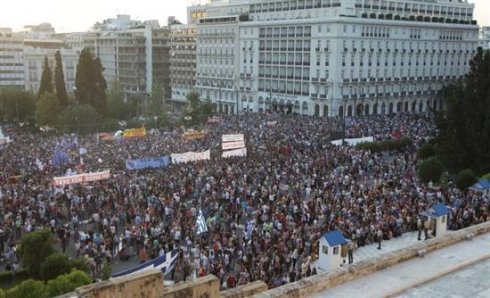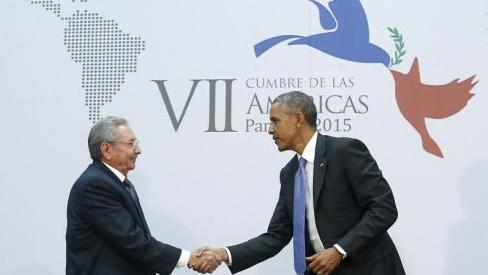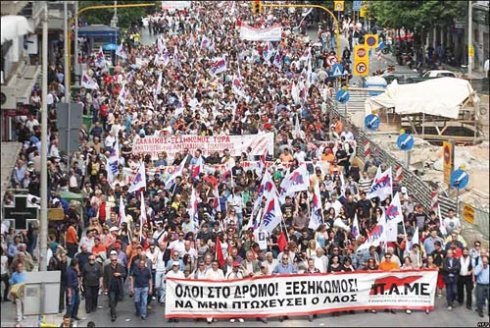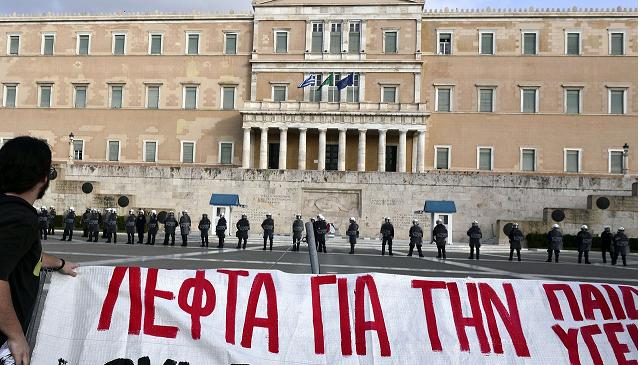Daily News Egypt - 10-02-2011
Telecom Egypt workers protest in front of the company building on Ramsis Street
09/02/2011
Thousands of workers continued their protests Wednesday across Egypt demanding better pay and work conditions and expressing solidarity with protesters in Tahrir Square.
Telecom Egypt workers protest in front of the company building on Ramsis Street
By Tamim Elyan / February 10, 2011, 12:20 am
Protesters’ demands included the appointment of staff on temporary contracts, change in the administrations of their respective organizations, enhancing the wage system and ending corruption.
In Cairo, the Independent Syndicate for Real Estate tax Workers organized a protest in front of the Egyptian Trade Union Federation (ETUF), demanding the resignation of Hussein Megawer, ETUF’s head, along with the federation’s board.
“The federation has become a center for fighting the activities of labor syndicates. Now we are demanding the investigation in its corruption and demanding the resignation of its board and allowing workers to form their independent syndicates freely,” said Kamal Abu Eita, head of the first independent syndicate in Egypt.
Hundreds of Telecom Egypt workers protested in front of Ramsis Exchange and obstructed the vital Ramsis Street demanding better wages and the resignation of the board members of the company and the communications syndicate.
Workers said that their monthly wages, around LE 600, have remained unchanged for more than 20 years while sector heads are paid LE 30,000 and the deputy heads of the company are paid LE 250,000 per month.
Five-thousand post workers protested in front of the Egypt Post Authority demanding the appointment of workers on temporary contracts and ending corruption in the authority.
“They cut our incentives by 50 percent in favor of consultants appointed from the military who receive more than LE 20,000 a month. They are refusing to appoint more than 4,000 temporary workers,” said Sameh Mohamed, a worker at the Post Authority who has been on a LE 600 monthly salary for the past 20 years.
Soha Ahmed, on a temporary contract since 1996, said she was denied permanent appointment although her colleague, who started working in 2001 received a starting salary of LE 4,000 per month.
“We are demanding investigations into illegal salaries that heads of sectors receive and the unfair appointments of new employees with high salaries while older ones are being ignored because of favoritism and corruption,” Soha said.
Tens of workers at the General Authority for Medical Insurance and Al Hilal Hospital protested demanding better wages and the appointment of more than 24,000 temporary workers.
Two-hundred workers at the General Authority for Pharmaceutical Drugs Monitoring organized a sit-in in front of the authority’s headquarters in Agouza demanding minimum wages of LE 1,200 and the appointment of temporary labor.
In Giza, Petrotrade’s workers protested in front of the company demanding equality with the rest of the company’s employees in incentives and revenue shares.
In Helwan, thousands of workers at Interment, Esenbro, Helwan Silk and Al-Nasr companies went on strike demanding better wages, better working conditions and healthcare.
The mostly female staff at the Egyptian Animal Health Research Center staged a demonstration on the center’s front step calling for the immediate resignation of the director, Mona Mehrez.
“She’s totally corrupt,” claimed one doctor, “She used the money allocated for studying and preventing avian flu to build personal villas in Cairo and Alexandria.”
Other members of the strike cited poor working conditions and nepotism as reasons for the protest. Of the approximately 150 workers 45 were chanting when the director’s car pulled up, saw the protest, then sped off causing a sudden cheer.
“The only reason she has her position is because her brother works in the Health Minister’s office,” claimed one middle-aged doctor wearing a white lab coat.
Having informally discussed the situation the previous day the protest was unplanned. When a small group of the protesters was asked if they were striking until the director resigned they seemed unsure. “This director takes a paid trip to the US and Europe every month, she’s got to go.”
The Center for Trade Union & Workers’ Services (CTUWS) reported numerous protests across the country.
In Mahalla, Ghazl Al Mahalla textile workers organized an open sit-in in front of the company’s administration demanding overdue promotions and the resignation of the company’s CEO, Foad Abdel Aleem, due to the huge losses of the company under his reign.
In Kafr Al Zayat, 1,500 workers at the city’s public hospital organized a sit-in inside it and were joined by doctors demanding the payment of late incentives.
In Sadat City in Menufya Governorate, 750 workers at Schweppes Beverages company organized a sit-in demanding better wages, receiving their payment for vacation days since public protests on Jan. 25, receiving their periodical raise, better incentives and better working and professional safety conditions.
Eight-hundred Nile Textiles workers organized a sit-in in front of its headquarters demanding better wages, a daily one-hour break and allowing them the vacation time dictated by law as they are only allowed one day-off per week.
The company’s owner, Mohamed Marzouq, gave the workers a vacation till Saturday in response, closed the company’s doors and ordered the company’s buses not to transport the workers.
In Suez, 400 workers at Egypt National Company for Steel went on a strike demanding better wages and said they haven’t receive any incentives for years.
In Ismailia, hundreds of workers at Al-Temsah and Harbors companies, affiliated with Suez Canal Authority, organized a sit-in in front of the company’s headquarters demanding the parity of wages and incorporating their companies with the authority.
They called for the 7,000 workers of the five other companies affiliated with the authority along the Canal in the cities of Port Said, Suez and Ismailia to join them in the sit-in.
Workers at Ismailia Governorate, Ismailia’s cultural center and Irrigation and Sanitation Authority organized protests demanding better wages and the payment of late incentives.
"The amount of protests reflects the dire conditions that Egyptian workers go through and their feeling of frustration since these problems directly affect their families’ livelihoods," Abu Eita said.
"Workers have always led the Egyptian protests movement and are participating heavily in Tahrir Square protests," he added. –Additional reporting by Troy Carter.




















